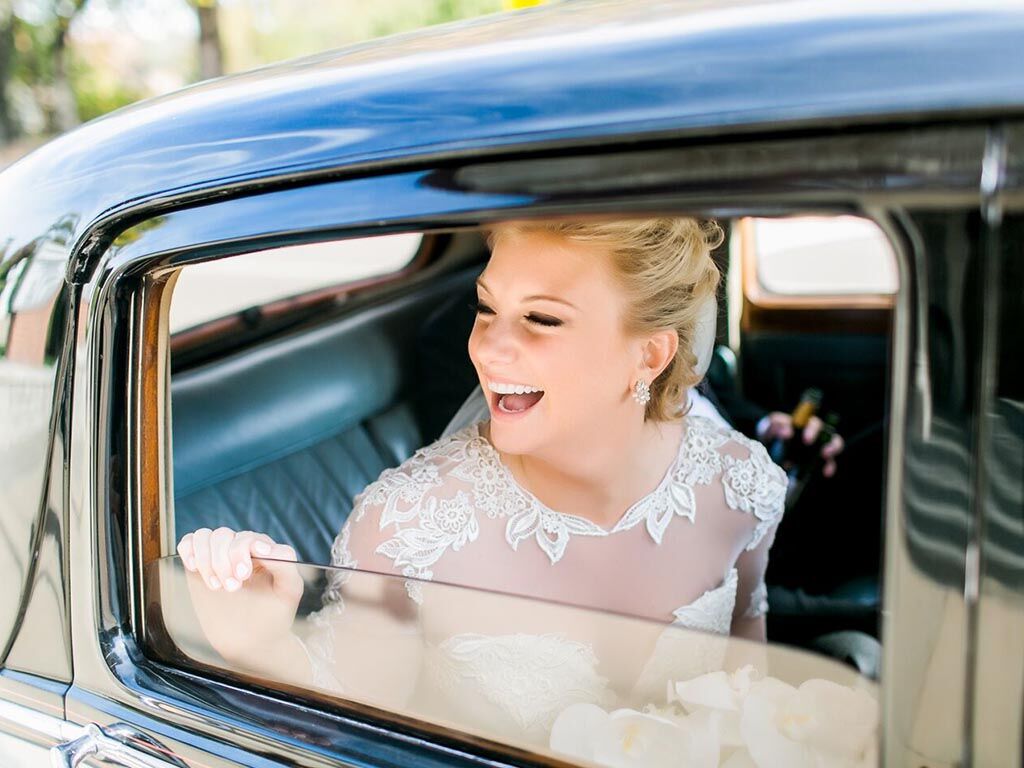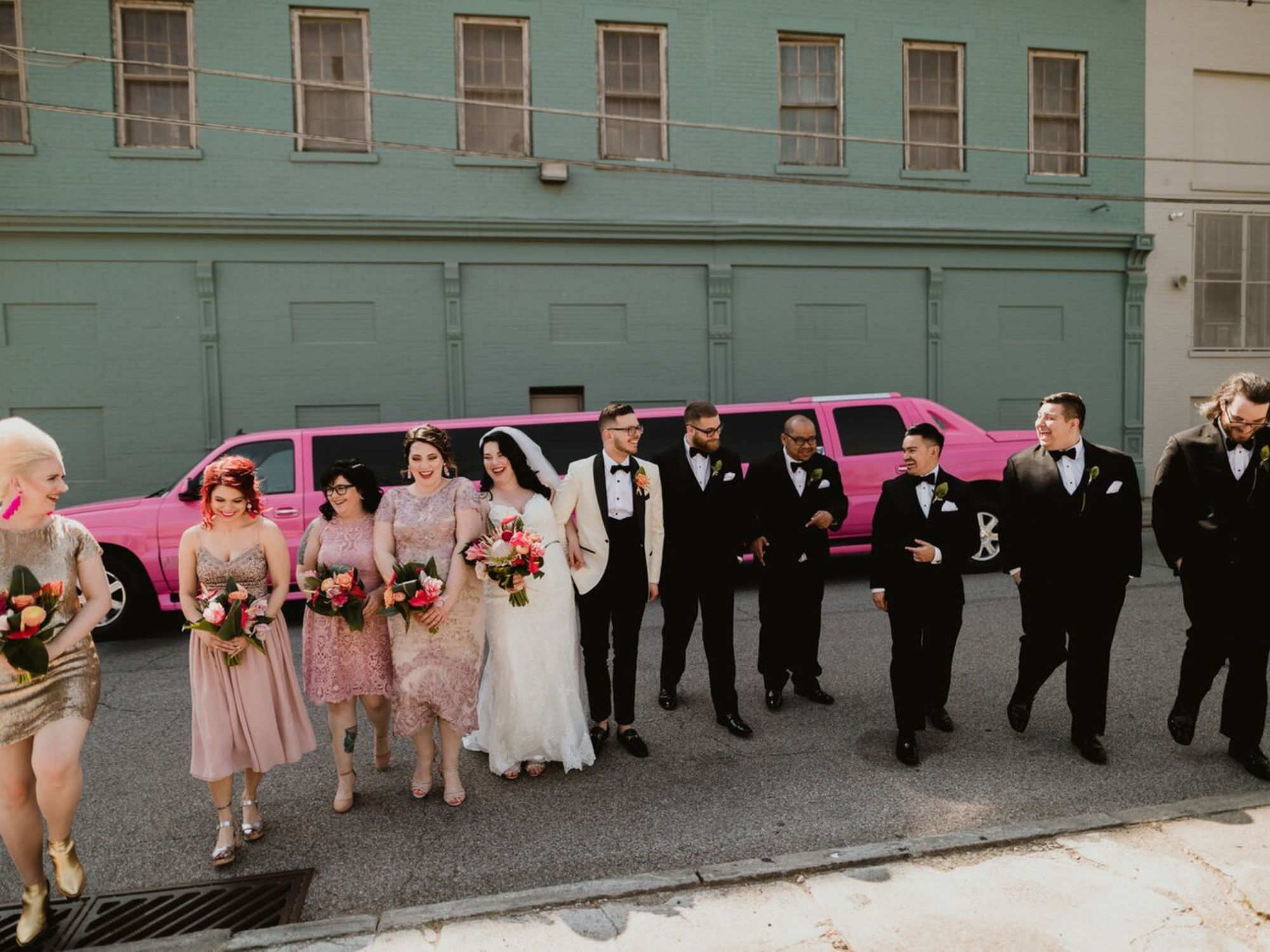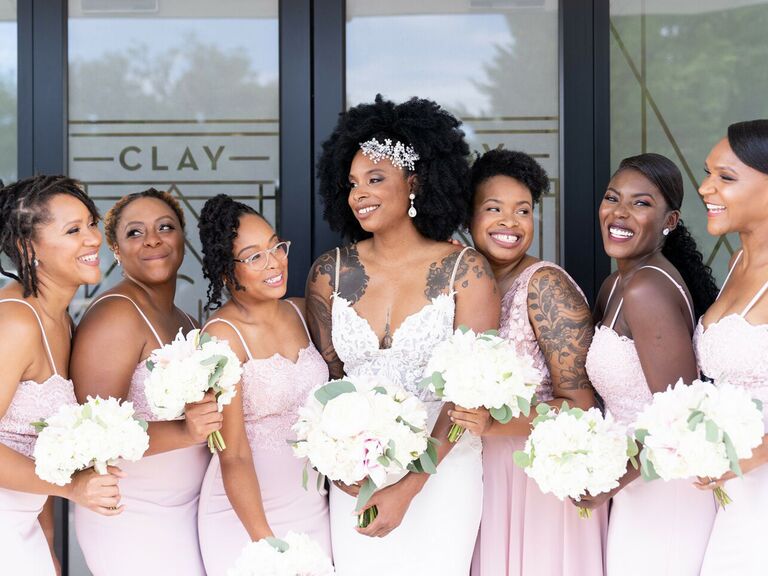All Your Bridesmaid Etiquette Questions, Answered!
Agreeing to be a bridesmaid can mean facing a deluge of confusion about individual roles and organization, not to mention occasional pangs of worry and frustration. Remember that it's an honor to stand by your loved one's side on their special day, and while figuring out bridesmaid etiquette can be a bit tricky, being in a close friend or family member's wedding party can actually be a lot of fun. We're here to help answer all of your more pressing bridesmaid etiquette questions to make the process as seamless and stress-free as possible.
What are a bridesmaid's responsibilities?
The list of bridesmaid duties can be summed up in just a few words: You're there to support the bride. This job can take a range of different forms, but many of the responsibilities actually take place before the wedding day. These tasks include buying a bridesmaid dress or other attire, planning the bridal shower and bachelorette party, and helping the bride with the wedding-planning process, including but not limited to dress shopping, tackling DIY projects, and simply being there for her.
On the big day, the bridesmaids get ready with the bride and pose for pictures. Then comes their moment in the spotlight—walking down the aisle and standing beside the bride during the wedding ceremony. At the reception, the bridesmaids may give a speech, but generally just need to be friendly and have fun on the dance floor. The wedding party members also attend the rehearsal dinner, morning-after brunch and any additional events during the wedding weekend.
How do a maid of honor's duties differ from a bridesmaid's?
The maid of honor (an unmarried lead attendant) or matron of honor (who is married) has a slightly expanded role as head of the bridal party. They'll lead the charge in planning the pre-wedding events, and usually give a speech during the wedding reception. The maid of honor will often sign the marriage license and help the bride with such tasks as bustling her wedding dress, collecting gifts, and making sure she eats and drinks.
What does a bridesmaid typically pay for?
The typical guest spends nearly $500 to attend a wedding, but a bridesmaid or maid of honor will spend far more than this. A bridesmaid is typically responsible for the following purchases:
- Attire and alterations
- Accessories (shoes, hair accessories, jewelry, etc.)
- Travel and accommodations for wedding
- Wedding gift
- Gifts for other occasions (bridal shower, engagement party, etc.)
- Hair and makeup, if professional hair and makeup are optional
- Planning costs associated with pre-wedding events (bachelorette party and/or bridal shower)
- Attire for prewedding events
The bride typically pays for the bridesmaids' bouquets or other floral accessories, and day-of transportation. She may or may not pay for the bridesmaids' hair and makeup (we'll get to that in a minute). If the bride and bridesmaids are staying together in a hotel suite or house the night before the wedding, the bride will usually cover those costs, as well.
Can I decline an invitation to be a bridesmaid?
There are many reasons why you might want to reject a bridesmaid proposal. Maybe you're dealing with a family situation, you're pregnant and due right around the wedding date, or you just lost your job and can't afford the cost right now. Discuss your concerns with the bride—you may be able to work out a solution, or you might have to politely bow out. Saying something like "I'm so flattered that you asked me to be part of the wedding, but right now I think it's best for me to attend as a guest because of [share your reasoning here]" will get the message across.
I'm on a really tight budget. How can I save money on being a bridesmaid?
There are many ways, big and small, to save money on bridesmaid costs. First of all, be upfront with the bride and the rest of the bridesmaids about your budget. Be sure to book your travel as early as possible, and take advantage of any room block discounts the couple has reserved. If you're able to pick your own attire, see if you can wear something you already own or borrow from a friend. And if you have to purchase new accessories, buy items that you will be able to rewear beyond the wedding day.
Do I get a say in the bridesmaid dress selection process?
There's no real etiquette on how much a bride should involve her bridesmaids in the choosing of dresses, but the more input she allows the better. It's important for attendants to like the bridesmaid dresses and to feel comfortable. She could round you guys up and try to collectively agree on a style and shade. Or each of you could talk to the bride separately, expressing your preferences. On the first dress shopping trip, the bride may want to take just her maid of honor along to scout things out. Then, when they narrow it down to a few styles, the rest of you can try on the dresses and give opinions. These days, many brides are giving bridesmaids free rein in choosing their own dress or attire, as long as it complements the wedding's color palette and is a particular length and/or fabric type.
Do the bridesmaids have to plan the bridal shower and the bachelorette party?
The bridesmaids, led by the maid of honor, traditionally host (read: plan and pay for) the bridal shower and bachelorette party. While the bridesmaids still usually plan the bachelorette party, the bridal shower may be hosted by other loved ones. It used to be taboo for the bride's mother or future mother-in-law to host the bridal shower (it could seem like the family was directly requesting gifts), but nowadays it's much more acceptable. Other loved ones, including close relatives or family friends, can host a shower, as well. The bride could have more than one shower thrown in her honor in different parts of the country, or a couple's shower. The bridesmaids should talk with the bride's family before starting to plan to make sure that they're on the same page about who's hosting and planning the shower.



Are bridesmaids supposed to buy a wedding gift for the couple?
Yes, bridesmaids typically buy a wedding gift for the couple, as well as a bridal shower gift and, potentially, an engagement gift (yes, we know, it's a lot). In terms of how much to spend, it really depends on your budget, but we recommend spending between $100 and $150 on a wedding gift, whether it's a physical gift purchased from the registry, or cash. You can also work with the other bridesmaids to split a larger group gift (like luggage or a full set of pots and pans, for example), which would allow each person to spend a bit less.
Can I bring a plus-one to the wedding?
If you're married or in a serious relationship, you should be invited to the wedding with your spouse or significant other. If you're not in a relationship or dating someone more casually, you might wonder if you can bring a date, or plus-one, to the wedding. We typically recommend that wedding party members be invited with a plus-one, regardless of relationship status, but the final decision belongs with the couple. There may be budgetary or capacity restraints that prevent the couple from inviting additional plus-ones, so try to be understanding if this is the case.
Do I have to give a toast?
Traditionally, the maid of honor gives a toast during the wedding reception, along with the best man and father (or parents) of the bride (or the parents of both partners). The rest of the bridesmaid crew may join the maid of honor for her speech, or they may give a separate toast at the rehearsal dinner, depending on the format of that event. Writing a maid of honor speech isn't the easiest of tasks for most people, but as long as it comes from the heart and avoids taboo topics, there's nothing to worry about. If you're really not into public speaking, there are other ways to express yourself including singing a song, creating a video slideshow of special photos or creating a piece of art to present to the newlyweds.
What's the etiquette around a bridesmaid's hair and makeup?
If the bride requires her 'maids to get their hair and makeup professionally done, it's good etiquette for the bride to pay for their services. If professional hair and makeup are optional, then the bridesmaids can pay for the services themselves if they choose to go that route.
Another bridesmaid is being totally uncooperative. What should I do?
Explain in a polite but firm manner that if she can't contribute her time in lieu of money that you and the other ladies will proceed with your bridesmaid duties without further efforts to consult her. Let her know that it will be obvious to others that she has not pitched in (i.e., the bridal shower invitations won't have her name on them). Or just focus on all of the nice things you and the other bridesmaids are going to do for your friend, rather than on this lone bridesmaid's shortcomings. If someone agrees to be a bridesmaid, they should participate to the best of their ability. Unfortunately, it's not your place to ask the bride to cast out someone she cares about just because you and the other bridesmaids don't feel she's up to the task.
The bride is being way too demanding. What should I do?
Weddings are unlike any other event in our lives. There's so much emotion and expectation inherent in the marriage process that sometimes brides can't see beyond themselves. It sounds like this particular gal could use a little perspective. However, dropping out of someone's bridal party is a very bold statement, devastating to the bride, and sure to end the friendship. If you're not ready to give this friend up, you need to set her straight. If that doesn't work, she may not be worth having as a friend. If you want to keep her as a friend, be sensitive to her fragile emotional state and write the experience off. Once she returns from the honeymoon, she may be back to her old lovable self.





















